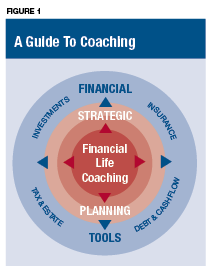We have reached a point in the financial services industry where it is time for providers to figure out what business they are really involved in. Tony Hallada, a managing principal at CliftonLarsonAllen Wealth Advisors LLC, recently told me that planners and advisors need to make up their minds about how they want to compete. Do they want to beat their competition on price, on performance or in relationships?
If you decide to compete on price, good luck. Commoditization alone will ground your ship. If you decide to compete on performance, double good luck, as markets, black swan events, euro crises and other gathering storms threaten to capsize your boat.
The best choice is to compete in relationships, which put you in better stead because you are in control of the factors that determine success and failure.
To do this, you must understand the type of value that you can deliver--and what people are willing to pay for. Being amicable and enjoyable to talk to and engaging in pleasant conversation are part of that value, but they are not going to command a premium. The greatest thing you can do in a relationship is transfer wisdom.
If you help your clients avoid mistakes, understand the bigger picture, prepare for the inevitable and exercise prudence and patience amid chaos, you have transferred wisdom. Being a great person who is pleasant to talk to just isn't going to cut it. There must be substantive-albeit intangible--value transferred in your conversations with clients.
To develop as a merchant of wisdom, you must first recognize that wisdom is your stock in trade. The second step is to comprehend the type of products you now deliver: instructive insight and actionable advice, strategies for confronting challenges and a calm prudence in a world gone mad.
I've created the illustration at right (See Figure 1) for wisdom merchants to use in explaining to clients and prospects what they are paying for. The central value is coaching and guidance. Excellent coaching is accomplished with an amalgam of strategy and inspiration. Good coaches not only teach the basics but they work toward inspiring the "players" to reach their potential. The inspiration side of coaching includes the value of helping people realize how well they could do--and what they could be--if they exercise discipline and stay the course. It is important that advisors define exactly what they mean or intend to accomplish as they "coach" their clients.

The wisdom merchant starts with the client's unique situation and explores the story that makes it unique. Using past experiences, present transitions and future possibilities, the wisdom merchant crafts a strategic plan, designed specifically for the client at hand. Ultimately, financial tools are used for that strategy, but only to help the client make progress.
Most of your competition is either selling financial investment advice and/or investment products or putting together financial plans and strategies. Both approaches have become highly commoditized. The core value of financial coaching hinges on how well we understand what makes each client unique and how skilled we become at transferring wisdom.
For example, Dan Lempe, John DuPriest and their group of advisors just opened America's Retirement Store in the Denver area. They conduct monthly seminars to educate clients and prospective clients about the complexities they face in their financial and retirement decisions. Their focus is not on products or investment choices but on making wise choices. Lempe states it this way, "Our goal is very straightforward: to help people understand the financial choices they have in today's confusing and at times dangerous investment environment. We know that a well-informed investor makes better decisions."
Simply stated, they are in the wisdom business and do a terrific job of explaining that value proposition to clients and seekers.








